Morocco Education: English Language University in Morocco
Al Akhawayn University, President, Driss Ouaouicha
We are unique in that we teach in English but also follow a liberal arts system of education. We teach the specifics of the major but also invest equally in educating the whole person.
Interview with Driss Ouaouicha, President of Al Akhawayn University
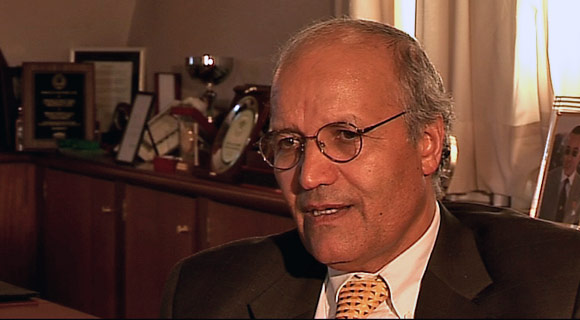
Dubai is trying to build a regional education hub in Abu Dhabi and has attracted many leading Universities- mainly Sorbonne and Lebanon. How is the attitude toward higher education different in Morocco compared to the MENA region?
We are unique in that we teach in English but also follow a liberal arts system of education. We teach the specifics of the major but also invest equally in educating the whole person.
We have an educational tradition that stems from within our nation as we had one of the first universities in the world in 850 but we also can see a French influence as a result of the colonization. For forty years the main mission was to produce cadres that the public administration needed but then the need was eliminated and then reform and adjustment were necessary. We need to be dependent on socio-econ needs and we need to be aware of whats needed and will work internationally and this lead to the creation of Al Akhawayn University that will introduce a new system. Mainstream universities need to see what does and doesn’t work and then adapt to what they observe. We recently switched to the semester and credit system as well as employing practitioners to engage the students. 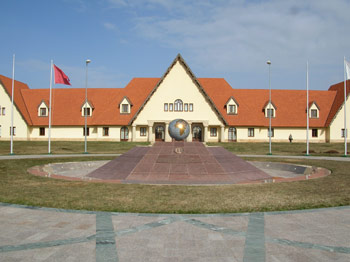
How quickly do you think new business and investment will curb unemployment in Morocco?
There are both external and internal factors that will determine this. The past ten years a lot of efforts have been made to provide the infrastructure needed to attract international investors and investment has grown substantially as a result. The past two years with the financial crisis and international challenges there have been international factors that have slowed down investment. Thanks to internal efforts Morocco has done a good job and this includes the flexibility of the educational system focusing more professional degrees that prepare graduates to better serve the investors needs.
What should be the government’s priorities for domestic reform in education?
The priority is to provide stronger links between the profiles the university produces and the needs of the economy outside the university. The alignment of the training with the social and economic needs is both a priority and a challenge. We have began to realize that the value in what we teach is determined by how useful it is for society and I think a lot of progress been made and statistically significant results have been made with employment placement. 86% find a job after graduation and 11% go on to graduate study and only less than 3% are looking for a job after six months.
What are the biggest challenges for Morocco’s education system?
The challenge is the alignment with the training with the socio-economic need and focusing on applied research that can serve the bigger needs of the nation. Also, contributing to continuing and executive education to help already working people keep up with modern technology and leadership.
Can you tell us more about your unique system and what can other universities in Morocco learn from you?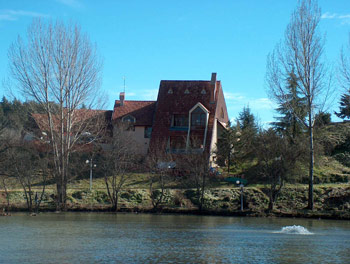
We are unique in that we teach in English but also follow a liberal arts system of education. We teach the specifics of the major but also invest equally in educating the whole person. Regardless of what major one chooses they all have to take classes in general education. The flexibility of our system is also notable because it gives them the ability to acquire transferable skills and adjust to various scenarios and be leaders. This is also possible because being a residential campus it allows for students to participate in activities and to take initiative with student clubs. These skills transfer to the professional world and they are universal skills that are very much needed today. Man Power did a study that found by the time a student in 40 years old they will have changed jobs 14 times and we ask ourselves, how can we prepare them for these changes? I believe it is the transferable skills gained through a liberal arts education will prepare students for this best.
What are some of the examples of success that stem from your university?
There are two important things to consider: One, internships are a must regardless of speciality and second, social responsibility-all of our students have to do at least 60 hours of community service. Our students need to know that in order for a country to progress and move forward everyone must do the same, not just one sector or population. These two things prepare our students to deal with the challenges of life and the feedback we get from employers is positive. 10% of our graduates have gone on to work abroad successfully as well and I am happy to say that 4-5% have started their own business and we look forward to seeing this figure grow.
As a private institution how difficult is it to attract students and are you fully satisfied with student enrollment?
We are a public institution that is managed like a private institution and this allows us greater responsibility and flexibility but also imposes upon us accountability. Most of our success depends on enrollment because we don’t have a large endowment and most of our revenue comes from enrollment. Our ambitions for the numbers are high but only to the point where we can maintain the quality of the education we offer. We don’t want to sacrifice numbers for quality. We aim for 1600-2000 students. We want to make Ifrane more of a university town where there are more accommodations and options for students. We have had to turn down qualified students due to a lack of housing so this is a big challenge for us right now. Currently we have 1650 students and we want to focus on quality. The only reason we want to increase is to up our critical mass and improve our faculty.
Is the location of Ifrane an advantage or an inconvenience?
For quite some time we thought it was a curse. When we were preparing the strategic plan two years ago I invited the alumni to comment and we thought of opening an annex in Casablanca but the students were reluctant and they actually loved the campus in Ifrane. The challenge is that people look at Ifrane as a package-not just studying but also accommodations, clubs, activities, and entertainment. We are talking with investors to build student housing and we have interest from people trying to build in town and build up the area. This is the shared responsibility of both our school and for the people outside of the university to build up the area. In Morocco the university town idea doesn’t exist yet so it is new for all of us. 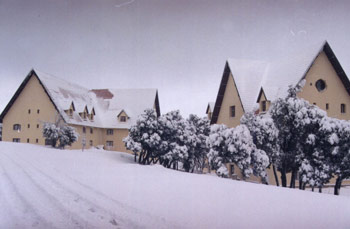
How do you face the competition on the international market when people can study anywhere they chose? Why would a student chose your university?
The undergraduate education quality we offer is no less than some of the universities in our region. Recently our language center and our school of business were accredited and our engineering school is being evaluated by IBET and we are optimistic it will be accredited as well. We are also working with NEASC in Boston for institutional accreditation and we are now candidates for being accredited by them. People will be able to obtain an internationally accredited university at home and in our culture families prefer their children stay close. We are reasonably priced compared to universities in Europe and the US and our cost per year including everything is 10,000 Euros.
How is your international integration going with schools abroad? What are some projects you have going on internationally?
We have over 90 collaborative agreements with various institutions and a majority are with American universities (around forty) and many of them concern student/faculty exchange and joint projects. For our graduating class in 2010 out of 265 students, 38% had gone abroad to study. In 2014 we hope this will be close to over 50% and we also want 20% of our students to be international although presently we are at 10%. We are aggressively pursuing this and in doing so going to an international student fair in Riyadh, looking towards sub-Saharan Africa for recruitment, and this summer and holding an international summer camp for graduating high school students. Every semester we have 60-70 international students, around 50 of which are degree seeking.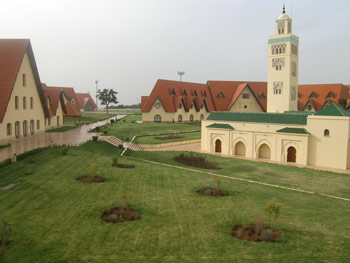
Where are you most interested in getting students from?
At first the American universities started encourage internationalization first so study abroad is very popularized there. They are more aggressive in sending students abroad so this curiosity attracts students. American students have been coming for the last ten years and people are likely attracted to this region because it has been a center for conflict and people want to learn more about it from a distance away from the tension. I think people leave here with an interesting and positive experience and I always tell students to live their lives here to the fullest and reserve their judgments until the end of their experience. It is both exciting for them and us here because we get to integrate different perspectives. For example, international students must live with a Moroccan student because this will help authenticate their experience in country.
Why are American students interested in coming here and what was their experience like?
At first the American universities started encourage internationalization first so study abroad is very popularized there. They are more aggressive in sending students abroad so this curiosity attracts students. American students have been coming for the last ten years and people are likely attracted to this region because it has been a center for conflict and people want to learn more about it from a distance away from the tension. I think people leave here with an interesting and positive experience and I always tell students to live their lives here to the fullest and reserve their judgments until the end of their experience. It is both exciting for them and us here because we get to integrate different perspectives. For example, international students must live with a Moroccan student because this will help authenticate their experience in country.
What is your vision and your dream for the university and how do you see it in 5-10 years?
I would like to have a more international campus to the point where we don’t need to do a double take when we see an international student on campus. We also plan to get international accreditation for the majority of our departments here and the university and I would like us to become a regional reference for the quality of education that will lead by example for other universities in the region. Our target is to be in the top ten universities in Africa and top fifteen in the Arab world. Currently we are 19th in Africa and 25th in the Arab world so we are working diligently towards this and this is an achievable goal for us. I would like to increase our service to the country when it comes to development projects and its alignment with what the government and country needs socially, economically, and politically. This year we are launching three new programs that are in line with the country’s development projects in renewable energy, cyber security, and also in logistics and supply chain management.
Would you like to only focus on undergraduate education or do you think you will progress to graduate/doctorate programs in the future?
We concentrate on undergraduate education because it is crucial and we believe it is where we impact the students the most. However we do have graduate programs and this is where we conduct research and further aligned our programs with the goals of the country and train leaders for the country. We do not have doctorate programs and this is a challenge for us out of concern for what our graduated would end up doing. Most go into academia but since all of our universities in Morocco aren’t under one system it will be a challenge due to language and the programs will have to be regional with other universities to ensure the usefulness of student’s training. We have over 100 graduates working in Dubai and Oman and their competence is appreciated in addition to their tri-culturalism.
What is the ratio of undergraduate to graduate students?
Around 90% are undergraduate and 10% are graduate. We would like to increase our graduate students and this is our goal for next year and with three new programs in the works we should be able to attract more students.